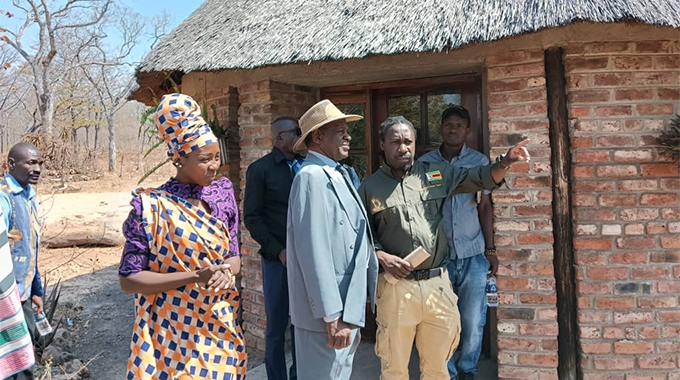Diaspora businessman invests over US$200k to Establish Lanyula Cultural Village in Rural Zimbabwe
SENIOR Government and traditional leaders yesterday visited Lanyula Cultural Village in Hwange’s Lubangwe area, to assess progress in the construction of the massive tourism facility that is expected to change the face of rural tourism in the country.
Lanyula means “sunset” in local Nambya and the project is a brainchild of diaspora based businessman Takudzva Mutepfa who has invested more than US$200 000.
The project will be over half a million and is part of efforts to complement Government efforts to promote rural tourism.
The concept centres around creating a melting pot for different Zimbabwean cultures, tribes and languages under one roof.
Tourism and Hospitality Industry Permanent Secretary Dr Takaruza Munyanyiwa in Black shirt talks to staleholders during a tour of Lanyula Cultural Village in Hwange’s Lubangwe area
Mr Mutepfa started constructing Lanyula Cultural Village seven years ago.
At the moment, a majority of the structures have been completed and partly furnished.
Upon completion, the cultural village will have six chalets for accommodation, a sky view lodge which will be a viewing platform to view the stars and moon at night as well as bird viewing, a central pavilion and kitchen.
There will also be a campsite to allow camping for those needing outdoor stay.
Lubangwe is on the edge of Hwange National Park, making the cultural village an ideal place for game viewing and game drives.
The village is set to become a melting pot for all cultures, tribes and languages in Zimbabwe. The name of the village
Lanyula Cultural Village proprietor Takudzva Mutepfa shows Chief Wange the place
The investment is in line with the Second Republic’s rural industrialisation agenda which seeks to capacitate rural areas to establish various industries to stem rural to urban migration.
The facility dovetails with Government support for rural industrialisation and transformation, community development and the need for diaspora investment to provide financial and technological support through joint ventures.
President Mnangagwa has declared that under the Second Republic, Government will drive rural industrialisation, which will see industrial activity being launched in rural areas based on endowments in each area to reverse rural-urban migration by ensuring that locals become key stakeholders and benefit from the resources around them.
The Government has already laid the preparatory groundwork for the transformation through, among many other things, establishing tertiary institutions, including vocational training centres in rural areas.
Besides promoting tourism, there will be employment creation and improvement of livelihoods for locals in line with Vision 2030.
Tourism and Hospitality Industry Permanent Secretary Dr Takaruza Munyanyiwa, Chief Wange, and officials from Ministries of Local Government and Public Works and Foreign Affairs and International Trade, joined by other Government Departments and Parastatals visited the facility yesterday.
Traditional dance groups from Mhondoro, Hwange, and performers from Bulawayo and Beitbridge provided entertainment.
The hidden goal of bringing dance groups from different cultural groups across the country was to knit together the cultural and tribal fabrics towards a united Zimbabwe, as key in promoting domestic tourism.
Chief Wange appreciated the project as a welcome development.
He urged his subjects to embrace other cultures and support the project.
“We have visited Lanyula Cultural Village and this resort seeks to showcase our culture. You have seen the Ndebele, Tonga, and Shona huts and it is the skills development that is important and we develop community tourism.
“To us this is a very important development which Falls under the culture and heritage. It is very important because we want to transform the way we integrate community tourism into mainstream tourism,” said Dr Munyanyiwa.
He said the project complements the President’s philosophy of leaving noone and no place behind.
“This is why we are here and the project is 90 percent complete. And they are ready to allocate accommodation. We are going to support them with skills and marketing so they are packaged within domestic tourism. This is a good package,” he said.
Mutepfa said he started investing in the project seven years ago.
“We are introducing what we call sustainable rural tourism for communities to stay self sufficient. People who have interest in traditional culture and food can come here. We used local resources and we will provide local dishes as we want to promote culture,” he said-chroncile









